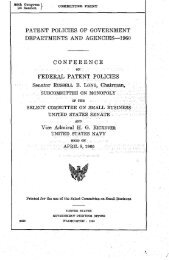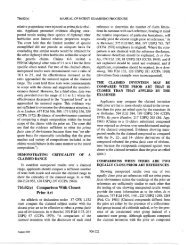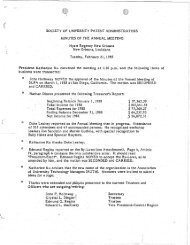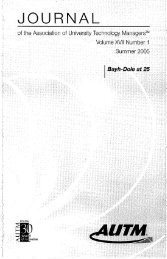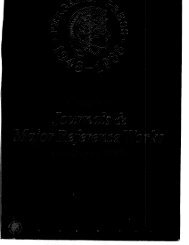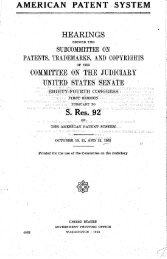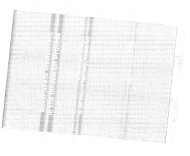Report of the Commission on Government ... - Bayhdolecentral
Report of the Commission on Government ... - Bayhdolecentral
Report of the Commission on Government ... - Bayhdolecentral
Create successful ePaper yourself
Turn your PDF publications into a flip-book with our unique Google optimized e-Paper software.
22<br />
Small Claims Boards<br />
Recommendati<strong>on</strong> 4. Establish a regi<strong>on</strong>al<br />
small claims boards system to resolve disputes<br />
involving $25,000 or less.<br />
Because our recommendati<strong>on</strong>s c<strong>on</strong>cerning <str<strong>on</strong>g>the</str<strong>on</strong>g><br />
agency boards <str<strong>on</strong>g>of</str<strong>on</strong>g> c<strong>on</strong>tract appeals would not<br />
alleviate <str<strong>on</strong>g>the</str<strong>on</strong>g> problem <str<strong>on</strong>g>of</str<strong>on</strong>g> processing small<br />
claims, we recommend establishment <str<strong>on</strong>g>of</str<strong>on</strong>g> a system<br />
<str<strong>on</strong>g>of</str<strong>on</strong>g> small claims boards <str<strong>on</strong>g>of</str<strong>on</strong>g> c<strong>on</strong>tract appeals<br />
(SCBCA) as a mechanism to provide a<br />
fast, relatively informal forum for <str<strong>on</strong>g>the</str<strong>on</strong>g> adjudicati<strong>on</strong><br />
<str<strong>on</strong>g>of</str<strong>on</strong>g> claims <str<strong>on</strong>g>of</str<strong>on</strong>g> $25,000 or less."<br />
The SCBCA system would be under central<br />
administrative c<strong>on</strong>trol and located in geographically<br />
dispersed cities according to caseload<br />
demands. A c<strong>on</strong>tractor would have <str<strong>on</strong>g>the</str<strong>on</strong>g><br />
opti<strong>on</strong> <str<strong>on</strong>g>of</str<strong>on</strong>g> taking a dispute involving $25,000 or<br />
less to an SCBCA. There would be no judicial<br />
review <str<strong>on</strong>g>of</str<strong>on</strong>g> an SCBCA decisi<strong>on</strong>, but a c<strong>on</strong>tractor<br />
could receive a new (de novo) trial in court<br />
after an adverse SCBCA decisi<strong>on</strong> if it desired.<br />
A decisi<strong>on</strong> adverse to <str<strong>on</strong>g>the</str<strong>on</strong>g> <strong>Government</strong> would<br />
be final, except in cases <str<strong>on</strong>g>of</str<strong>on</strong>g> fraud.<br />
The SCBCA system would operate under informal,<br />
accelerated procedures, and <str<strong>on</strong>g>the</str<strong>on</strong>g> agency<br />
boards <str<strong>on</strong>g>of</str<strong>on</strong>g> c<strong>on</strong>tract appeals would no l<strong>on</strong>ger<br />
have an opti<strong>on</strong>al accelerated procedure. The<br />
natural tendency for any quasi-judicial administrative<br />
board is to become increasingly formal<br />
and cumbersome, as have <str<strong>on</strong>g>the</str<strong>on</strong>g> agency<br />
boards in recent years. In <str<strong>on</strong>g>the</str<strong>on</strong>g> case <str<strong>on</strong>g>of</str<strong>on</strong>g> <str<strong>on</strong>g>the</str<strong>on</strong>g><br />
SCBCA system, <str<strong>on</strong>g>the</str<strong>on</strong>g> lack <str<strong>on</strong>g>of</str<strong>on</strong>g> pressure to build a<br />
record due to <str<strong>on</strong>g>the</str<strong>on</strong>g> de novo judicial review will<br />
subdue <str<strong>on</strong>g>the</str<strong>on</strong>g> tendency to become more formal.<br />
However, <str<strong>on</strong>g>the</str<strong>on</strong>g> system should have appropriate<br />
supervisi<strong>on</strong> and c<strong>on</strong>trol to ensure that it remains<br />
expeditious and informal.<br />
We c<strong>on</strong>sider $25,000 an appropriate ceiling<br />
for <str<strong>on</strong>g>the</str<strong>on</strong>g> SCBCA's jurisdicti<strong>on</strong>al limit. Based <strong>on</strong><br />
data developed in our study, 63 percent <str<strong>on</strong>g>of</str<strong>on</strong>g> <str<strong>on</strong>g>the</str<strong>on</strong>g><br />
present appeals handled by agency boards<br />
would be eligible for <str<strong>on</strong>g>the</str<strong>on</strong>g> SCBCA procedure."<br />
The SCBCA system could be independent, or<br />
could operate as an arm <str<strong>on</strong>g>of</str<strong>on</strong>g> an agency board, or<br />
3l Bills to establish regi<strong>on</strong>al small claims divisi<strong>on</strong>s <str<strong>on</strong>g>of</str<strong>on</strong>g> exiattng<br />
boards were introduced in C<strong>on</strong>gress by Senator McIntyre (8. 3616)<br />
and Rep. C<strong>on</strong>te (H.R. 15045) in May 1972.. Apart rrom <str<strong>on</strong>g>the</str<strong>on</strong>g> faet that<br />
<str<strong>on</strong>g>the</str<strong>on</strong>g>ir small claims boards would be divisi<strong>on</strong>s <str<strong>on</strong>g>of</str<strong>on</strong>g> existing boards, <str<strong>on</strong>g>the</str<strong>on</strong>g>se<br />
bills differ from our recommendati<strong>on</strong>s in that '<str<strong>on</strong>g>the</str<strong>on</strong>g>y make no provisi<strong>on</strong>s<br />
for an opti<strong>on</strong> <str<strong>on</strong>g>of</str<strong>on</strong>g> a due process hearing or de novo judicial<br />
review, and propose a higher jul'isdicti<strong>on</strong>al limit.<br />
•, See table 2, 8upra.<br />
/<br />
Part G<br />
even <str<strong>on</strong>g>the</str<strong>on</strong>g> Court <str<strong>on</strong>g>of</str<strong>on</strong>g> Claims. However, <str<strong>on</strong>g>the</str<strong>on</strong>g> operati<strong>on</strong><br />
<str<strong>on</strong>g>of</str<strong>on</strong>g> <str<strong>on</strong>g>the</str<strong>on</strong>g> SCBCA system should be as aut<strong>on</strong>omous<br />
as possible from any parent board or<br />
court, since it is important that <str<strong>on</strong>g>the</str<strong>on</strong>g> SCBCAs<br />
establish <str<strong>on</strong>g>the</str<strong>on</strong>g>ir own traditi<strong>on</strong>, organizati<strong>on</strong>,<br />
and procedures that are distinct and highly<br />
visible. If <str<strong>on</strong>g>the</str<strong>on</strong>g> SCBCAs were closely tied to<br />
<str<strong>on</strong>g>the</str<strong>on</strong>g> agency boards or courts, <str<strong>on</strong>g>the</str<strong>on</strong>g>y would appear<br />
to be merely a sec<strong>on</strong>d-class versi<strong>on</strong> <str<strong>on</strong>g>of</str<strong>on</strong>g> <str<strong>on</strong>g>the</str<strong>on</strong>g> parent<br />
forum, and like <str<strong>on</strong>g>the</str<strong>on</strong>g> present accelerated procedures,<br />
<str<strong>on</strong>g>the</str<strong>on</strong>g>y might not be used. More important,<br />
<str<strong>on</strong>g>the</str<strong>on</strong>g> members <str<strong>on</strong>g>of</str<strong>on</strong>g> <str<strong>on</strong>g>the</str<strong>on</strong>g> SCBCAs must develop a<br />
particular expertise in handling small claims<br />
rapidly and fairly, with a minimum <str<strong>on</strong>g>of</str<strong>on</strong>g> "due<br />
process" procedures. This will require a firm<br />
approach with litigants who want to overjudicialize<br />
<str<strong>on</strong>g>the</str<strong>on</strong>g>ir appeals.<br />
Finally, <str<strong>on</strong>g>the</str<strong>on</strong>g> SCBCA system should be staffed<br />
with board members <str<strong>on</strong>g>of</str<strong>on</strong>g> a grade and caliber<br />
equal to <str<strong>on</strong>g>the</str<strong>on</strong>g> members <str<strong>on</strong>g>of</str<strong>on</strong>g> <str<strong>on</strong>g>the</str<strong>on</strong>g> agency boards.<br />
All Disputes Power<br />
Recommendati<strong>on</strong> 5. Empower c<strong>on</strong>tracting<br />
agencies to settle and pay, and administrative<br />
forums to decide, all claims or disputes<br />
arising under or growing out <str<strong>on</strong>g>of</str<strong>on</strong>g> or in c<strong>on</strong>necti<strong>on</strong><br />
with <str<strong>on</strong>g>the</str<strong>on</strong>g> administrati<strong>on</strong> or performance<br />
<str<strong>on</strong>g>of</str<strong>on</strong>g> c<strong>on</strong>tracts entered into by <str<strong>on</strong>g>the</str<strong>on</strong>g><br />
United States.<br />
We can find no valid reas<strong>on</strong> for <str<strong>on</strong>g>the</str<strong>on</strong>g> distincti<strong>on</strong><br />
between disputes "under <str<strong>on</strong>g>the</str<strong>on</strong>g> c<strong>on</strong>tract,"<br />
that procuring agencies may settle and pay,<br />
and disputes in "breach <str<strong>on</strong>g>of</str<strong>on</strong>g> c<strong>on</strong>tract," that <str<strong>on</strong>g>the</str<strong>on</strong>g>y<br />
may not.<br />
The ir<strong>on</strong>y in <str<strong>on</strong>g>the</str<strong>on</strong>g> present situati<strong>on</strong> is that,<br />
while <str<strong>on</strong>g>the</str<strong>on</strong>g> procuring agencies are not supposed<br />
to have <str<strong>on</strong>g>the</str<strong>on</strong>g> power to decide or settle breach <str<strong>on</strong>g>of</str<strong>on</strong>g><br />
c<strong>on</strong>tract disputes, that is, disputes not based<br />
<strong>on</strong> a c<strong>on</strong>tract clause c<strong>on</strong>veying board jurisdicti<strong>on</strong>,<br />
<str<strong>on</strong>g>the</str<strong>on</strong>g>y may in effect gain this power merely<br />
by placing a clause in <str<strong>on</strong>g>the</str<strong>on</strong>g> c<strong>on</strong>tract providing<br />
an administrative remedy for <str<strong>on</strong>g>the</str<strong>on</strong>g> particular<br />
dispute." This transforms <str<strong>on</strong>g>the</str<strong>on</strong>g> dispute into <strong>on</strong>e<br />
administratively cognizable under <str<strong>on</strong>g>the</str<strong>on</strong>g> c<strong>on</strong>tract.<br />
The distincti<strong>on</strong> between disputes arising under<br />
<str<strong>on</strong>g>the</str<strong>on</strong>g> c<strong>on</strong>tract and breach <str<strong>on</strong>g>of</str<strong>on</strong>g> c<strong>on</strong>tract disputes<br />
is not logical or useful, since it is based <strong>on</strong> <str<strong>on</strong>g>the</str<strong>on</strong>g><br />
.,..Shedd, Administrative Authority to Settle Cla/lm3 for Breach <str<strong>on</strong>g>of</str<strong>on</strong>g><br />
<strong>Government</strong> C<strong>on</strong>tractB, 27 Geo. Wash. L. Rev. 481, 517 (1959) .



